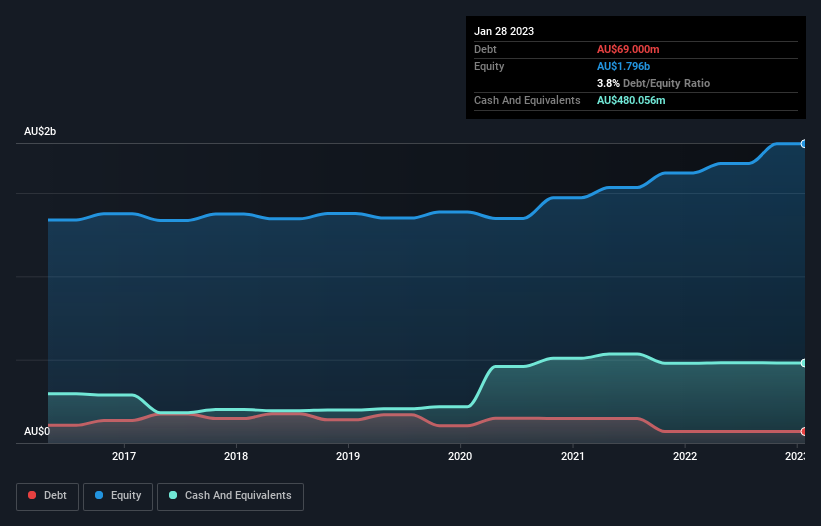
Some say volatility, rather than debt, is the best way to think about risk as an investor, but Warren Buffett famously said that 'Volatility is far from synonymous with risk.' When we think about how risky a company is, we always like to look at its use of debt, since debt overload can lead to ruin. Importantly, Premier Investments Limited (ASX:PMV) does carry debt. But the real question is whether this debt is making the company risky.
When Is Debt A Problem?
Generally speaking, debt only becomes a real problem when a company can't easily pay it off, either by raising capital or with its own cash flow. Part and parcel of capitalism is the process of 'creative destruction' where failed businesses are mercilessly liquidated by their bankers. However, a more common (but still painful) scenario is that it has to raise new equity capital at a low price, thus permanently diluting shareholders. By replacing dilution, though, debt can be an extremely good tool for businesses that need capital to invest in growth at high rates of return. When we think about a company's use of debt, we first look at cash and debt together.
View our latest analysis for Premier Investments
What Is Premier Investments's Debt?
The chart below, which you can click on for greater detail, shows that Premier Investments had AU$69.0m in debt in January 2023; about the same as the year before. But it also has AU$480.1m in cash to offset that, meaning it has AU$411.1m net cash.

How Healthy Is Premier Investments' Balance Sheet?
Zooming in on the latest balance sheet data, we can see that Premier Investments had liabilities of AU$385.5m due within 12 months and liabilities of AU$261.6m due beyond that. Offsetting this, it had AU$480.1m in cash and AU$12.5m in receivables that were due within 12 months. So it has liabilities totalling AU$154.5m more than its cash and near-term receivables, combined.
Since publicly traded Premier Investments shares are worth a total of AU$4.15b, it seems unlikely that this level of liabilities would be a major threat. However, we do think it is worth keeping an eye on its balance sheet strength, as it may change over time. Despite its noteworthy liabilities, Premier Investments boasts net cash, so it's fair to say it does not have a heavy debt load!
Another good sign is that Premier Investments has been able to increase its EBIT by 25% in twelve months, making it easier to pay down debt. There's no doubt that we learn most about debt from the balance sheet. But ultimately the future profitability of the business will decide if Premier Investments can strengthen its balance sheet over time. So if you want to see what the professionals think, you might find this free report on analyst profit forecasts to be interesting.
Finally, while the tax-man may adore accounting profits, lenders only accept cold hard cash. While Premier Investments has net cash on its balance sheet, it's still worth taking a look at its ability to convert earnings before interest and tax (EBIT) to free cash flow, to help us understand how quickly it is building (or eroding) that cash balance. Over the last three years, Premier Investments actually produced more free cash flow than EBIT. That sort of strong cash conversion gets us as excited as the crowd when the beat drops at a Daft Punk concert.
Summing Up
We could understand if investors are concerned about Premier Investments's liabilities, but we can be reassured by the fact it has has net cash of AU$411.1m. The cherry on top was that in converted 118% of that EBIT to free cash flow, bringing in AU$383m. So we don't think Premier Investments's use of debt is risky. Another positive for shareholders is that it pays dividends. So if you like receiving those dividend payments, check Premier Investments's dividend history, without delay!
At the end of the day, it's often better to focus on companies that are free from net debt. You can access our special list of such companies (all with a track record of profit growth). It's free.
New: Manage All Your Stock Portfolios in One Place
We've created the ultimate portfolio companion for stock investors, and it's free.
• Connect an unlimited number of Portfolios and see your total in one currency
• Be alerted to new Warning Signs or Risks via email or mobile
• Track the Fair Value of your stocks
Have feedback on this article? Concerned about the content? Get in touch with us directly. Alternatively, email editorial-team (at) simplywallst.com.
This article by Simply Wall St is general in nature. We provide commentary based on historical data and analyst forecasts only using an unbiased methodology and our articles are not intended to be financial advice. It does not constitute a recommendation to buy or sell any stock, and does not take account of your objectives, or your financial situation. We aim to bring you long-term focused analysis driven by fundamental data. Note that our analysis may not factor in the latest price-sensitive company announcements or qualitative material. Simply Wall St has no position in any stocks mentioned.
About ASX:PMV
Premier Investments
Operates various specialty retail fashion chains in Australia, New Zealand, Asia, and Europe.
Excellent balance sheet and good value.
Similar Companies
Market Insights
Community Narratives



